Pope Francis' words about 'the great majority' of Catholic marriages being invalid have, it appears, been redacted, in the official transcript of his press conference at the Lateran on Thursday, to read 'some' Catholic marriages. Assuming that the Holy Father had a hand in this, or at least allowed it to happen, we should understand it as his second thoughts. He acknowledges, in some sense, that what he said the first time was not right, or not wise. This ought to mean that the people criticising us for disagreeing with the Pope should now eat their words, since he agrees with us in disagreeing with what he said, but I don't suppose many of them will look at it that way.
What we can all agree about is that there is a crisis of marriage. I would also like to draw out one aspect of what the Pope said, or implied, which I also agree with: that the problem is not that people simply don't know, intellectually, what marriage is, but that, deep down, that understanding is not part of them. 'They say it', the Pope says. But in some sense, they don't grasp it. The problem, then, is not, as many people have suggested, a deficiency of marriage preparation. A course of talks could catechise couples; it cannot give them a culture or virtue.
The problem is one of formation, not knowledge. That problem manifests itself not in the nullity of marriages, but in their failure.
Of course good marriage preparation would be a good idea. What would make even more difference would be if the couples made a good confession immediately before the wedding. Getting married in a state of grace is necessary to receiving the graces of the sacrament, in marriage as with Holy Communion and Holy Orders. Perhaps bringing couples to confession should be a priority for marriage preparation. What that means, of course, in the context of couples who are mostly cohabiting before marriage, is that the marriage prep. should not be about catechesis so much as about bringing about a conversion of life. Not patting them on the back and saying, we don't condemn, and anyway you are getting married now, but rather saying: if you are to form a Catholic family, you need to straighten your lives out.
Something else worth saying is that if we suspect there is a crisis of invalidity in marriage, the Church must react as she would to a crisis of invalidity with Holy Orders or Baptism: not by bewailing the problem, but by making the sacrament valid. Call in the couples and get them to go through a conditional form of marriage with the right intentions; don't just wait for them to divorce and say, oh well it was probably invalid. The fact that this option is not being discussed suggests to me that the idea of invalidity is not being used, in this debate, in a serious way, to mean what it actually means. Invalidity is not just a handy excuse to get remarried. It is a defect in a sacrament which means that it hasn't worked. If it's not worked, it's not had its good effects. In that case it should be - and could easily be - sorted out. If, that is, we care about Catholics' marriages.
Support the work of the LMS by becoming an 'Anniversary Supporter'.
Labels
- Bishops
- Chant
- Children
- Clerical abuse
- Conservative critics of the EF
- Correctio Filialis
- FIUV Position Papers
- Fashion
- Freemasonry
- Historical and Liturgical Issues
- Islam
- Liberal critics of the EF
- Marriage & Divorce
- Masculinity
- New Age
- Patriarchy
- Pilgrimages
- Pope Francis
- Pro-Life
- Reform of the Reform
- Young people
Showing posts with label Can the Church change Marriage?. Show all posts
Showing posts with label Can the Church change Marriage?. Show all posts
Saturday, June 18, 2016
Friday, June 17, 2016
The Pope is wrong about Catholic marriages being invalid
Yesterday Pope Francis gave a press conference at St John's Lateran.
NBC News:
"Young people say 'for life,' but they do not know what it means," he said. And because they get married with the philosophy that a marriage can be ended if it becomes an "inconvenience," their marriages are "nulli," he said, using an Italian word that can be translated as "baseless" or "invalid."
CNA:
“It’s provisional, and because of this the great majority of our sacramental marriages are null. Because they say “yes, for the rest of my life!” but they don’t know what they are saying. Because they have a different culture. They say it, they have good will, but they don’t know.”
...
Pope Francis attributed the marriage crisis to people who “don’t know what the sacrament is” and don’t know “the beauty of the sacrament.”
“They don’t know that it’s indissoluble, they don’t know that it’s for your entire life. It’s hard,” the Pope said.
He said that in Argentina’s northeast countryside, couples have a child and live together. They have a civil wedding when the child goes to school, and when they become grandparents they “get married religiously.”
“It’s a superstition, because marriage frightens the husband. It’s a superstition we have to overcome,” the Pope said. “I’ve seen a lot of fidelity in these cohabitations, and I am sure that this is a real marriage, they have the grace of a real marriage because of their fidelity, but there are local superstitions, etc.”
I can't find anything approaching a full and chronological transcript, but the audio is available for those who speak Italian. There doesn't seem to be much doubt about what he said or what it meant.
(Update: there is a transcript in Italian, but that's a story in itself.)
NBC News:
"Young people say 'for life,' but they do not know what it means," he said. And because they get married with the philosophy that a marriage can be ended if it becomes an "inconvenience," their marriages are "nulli," he said, using an Italian word that can be translated as "baseless" or "invalid."
CNA:
“It’s provisional, and because of this the great majority of our sacramental marriages are null. Because they say “yes, for the rest of my life!” but they don’t know what they are saying. Because they have a different culture. They say it, they have good will, but they don’t know.”
...
Pope Francis attributed the marriage crisis to people who “don’t know what the sacrament is” and don’t know “the beauty of the sacrament.”
“They don’t know that it’s indissoluble, they don’t know that it’s for your entire life. It’s hard,” the Pope said.
...
He said that in Argentina’s northeast countryside, couples have a child and live together. They have a civil wedding when the child goes to school, and when they become grandparents they “get married religiously.”
“It’s a superstition, because marriage frightens the husband. It’s a superstition we have to overcome,” the Pope said. “I’ve seen a lot of fidelity in these cohabitations, and I am sure that this is a real marriage, they have the grace of a real marriage because of their fidelity, but there are local superstitions, etc.”
I can't find anything approaching a full and chronological transcript, but the audio is available for those who speak Italian. There doesn't seem to be much doubt about what he said or what it meant.
(Update: there is a transcript in Italian, but that's a story in itself.)
Thursday, January 07, 2016
Doubting one's marriage
With apologies for the long break from blogging, here is something I saw via Mary's Advocates (who promote a proper understanding of Catholic marriage). This married permanent deacon, on being trained in the matter of marriage anullments, made the unpleasant discovery that his happy, successful, 17-year marriage could easily be annulled - that is, it would clearly be possible to gain a declaration of nullity, given the circumstances of their getting married. (See the video at 3 1/2 minutes in.)
I suspect that this will be the case for a good number of Catholics with happy marriages. It doesn't necessarily mean that these marriages are actually invalid. Some might be, and the best response might be to make them valid, which should not be difficult to do. But the idea that the current legal procedures of the Church, coupled with the current practices in relation to marriage preparation, combine to mean that vast numbers of couples could walk away from their marriage vows, is vertiginous.
If this isn't something that Bishops and priests should do something about, urgently, I don't know what is.
I suspect that this will be the case for a good number of Catholics with happy marriages. It doesn't necessarily mean that these marriages are actually invalid. Some might be, and the best response might be to make them valid, which should not be difficult to do. But the idea that the current legal procedures of the Church, coupled with the current practices in relation to marriage preparation, combine to mean that vast numbers of couples could walk away from their marriage vows, is vertiginous.
If this isn't something that Bishops and priests should do something about, urgently, I don't know what is.
Monday, February 10, 2014
Can the Church change Marriage? 3: Discipline
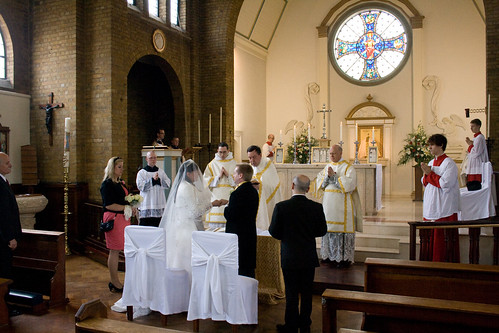
Over the years liberals like Mgr Basil Loftus have thrown out all kinds of half-baked ideas about what, in practice, the Church could do to be more 'Merciful' in relation to marriage and divorce. Loftus has suggested, for example, that somehow it be possible for a baptised Christian couple to contract a valid natural marriage, since under certain circumstances natural marriages can be dissolved by the Church allowing for remarriage. This raises incredibly complicated theological and canonical questions, and I really don't see how it would solve anything even if it were possible. If a couple's marriage is declared non-sacramental, that is a decree of nullity. If they want to divorce and remarry, they can. If they want to make their marriage sacramentally valid, they can. How does saying that they have a natural marriage help anyone?
The obvious way forward might seem to be simply to expand the grounds, or the interpretation of the grounds, for declarations of nullity. But this is more difficult than it looks. Marriages are null, essentially, if either party did not make a free and sincere marriage vow to marry the person he or she thought they were marrying. This can mean that undisclosed mental health issues can invalidate a marriage, undue pressure to marry, or a prior determination not to be faithful or fruitful within marriage.
What the liberals would like to see (and this is why they like the Orthodox practice) is a ground for annulment along the lines of grounds for secular divorce: something like 'irretrievable breakdown of the relationship'. But this cannot be a basis for determining the nullity of a marriage, which is why the Orthodox talk not about nullity but 'death'. For it to be null it has to have been null from the first moment, at the Altar rails. That is what nullity - sacramental invalidity - means: it was never valid.
I've already written about the possibility of adopting the Orthodox practice. This illustrates the problem of trying to create a hybrid position.
And here's another thought. It is not usually regarded as 'pastoral' to make it harder to perform a sacrament. And yet that is what the liberals are trying to do with their development of the theology of marriage. They want, in fact, to make getting validly married as difficult as possible. Pope Benedict remarked laconically:
We run the risk of falling into an anthropological pessimism which, in the light of today's cultural situation, considers it almost impossible to marry.
This is perhaps the ultimate fairness: not 'marriage for everyone', but 'marriage for no-one.'
Perhaps you can, instead, interpret the existing grounds of nullity in an elastic way, and it is often said that this happens to the point of abuse in some jurisdictions. Certainly, successive Popes have demanded that tribunals take their task seriously and strictly. Ultimately, tribunals are trying to establish a fact: was a sacrament validly accomplished, or not. They cannot make a marriage null. Their role is to reassure the couple and everyone that it is reasonable to proceed with a subsequent marriage. If they declare a marriage null which was not null, subsequent marriages will be objectively invalid.
Let us take a moment to consider that. Suppose tribunals became lax and just rubber-stamped applications. Catholics in good conscience would re-marry in church without being really free to do so. They would be in an objective state of grievous sin, and the second marriage would not be sacramentally valid. They would not be in mortal sin - they would not go to hell for this - because mortal sin requires both gravity and consciousness on the part of the agent. But they would lack the graces which flow from the sacrament, which help to develop the marital relationship and assist them in raising their children. Furthermore, the exercise of their marital duties, however heroic, would lack merit, and they could not, through them, grow in virtue. They would be a lot worse off than those in valid natural marriages. It is a bad situation to be in.
The idea that this situation should be encouraged for the sake of 'Mercy' is simply appalling. Essentially the proposal is to rob Catholics of their confidence that tribunals can establish the facts to a reasonable degree of certainty, and therefore of their confidence that they are free to remarry. If this is Mercy, give me Justice...
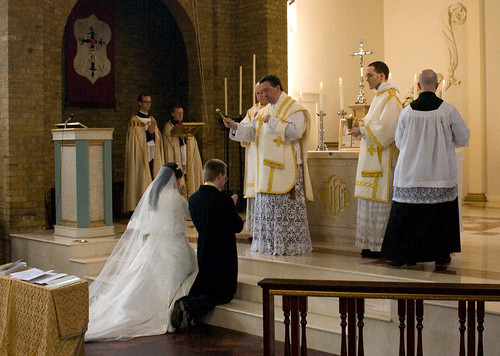
Here's the final option. Leave the tribunals alone and just focus on what happens to Catholics who have remarried outside the Church. They have ignored the fact that their first marriages were (or might be) valid; they have defied the Church, their former spouse, and Our Lord's words, to establish an adulterous relationship, and have furthermore raised this adulterous relationship to the status of a legally recognised and binding contract. Their adultery is no longer something private, which we might ignore, or simply not know about. They force it on the attention of the state and of society: they want to be known and Mr & Mrs Smith. They come into church and queue up for communion. What should the priest do?
Well, he can give them Holy Communion: that's what the liberals want to hear. Why not? Canon Law says otherwise, but Canon Law - say the liberals - can be changed or ignored. (They've certainly put in a lot of practice doing the latter.) Isn't this a Merciful solution?
Now these couples are not 'in good conscience'. Their sin is, as I have noted, a self-conscious and deliberate public violation of the Natural Law. They may, of course, have convinced themselves that the Church is wrong about marriage, but the point of the example is that they are painfully aware of the incompatibility between their state of life and the Church's discipline.
The public nature of their marital status means that ordinary considerations of scandal, in dealing with sinners asking for Communion, are reversed. Ordinarily, if a priest knows privately, or under the Seal of Confession, that a person asking (publicly) for Communion is in a state of mortal sin, to refuse would be to publish this fact (detraction), and cause scandal to others. In this case, the priest knows publicly, and other people present know, of the sin, and the scandal would be caused by giving the Communion, not withholding it. So although the Communion of a private sinner is a sacrilege, the priest must go along with it. The opposite is the case with the public sinner.
And in this, of course, the public sinner is at a huge advantage. Yes, advantage. By what twisted logic, in what alternative, liberal, universe, is it not an advantage to be prevented from committing an sacrilegious act? It is true that the remarried divorcee may have committed it already in intention. But it is another matter actually to have received Our Lord sacrilegiously. As the Corpus Christi Sequence expresses it:
Both the wicked and the good
Eat of this celestial Food;
But with ends how opposite!
Here 'tis life; and there 'tis death;
The same, yet issuing to each
In a difference infinite.
How, pray, is it a work of Mercy to administer the means of spiritual death to a sinner? This is something which we need to keep in the forefront of our minds. The objective gravity of the sacrilegious Communion is one thing, certainly. I've been reading about the Medieval theologian William of Auxerre, who described this situation as 'throwing Christ into the latrine of the Devil' - the priest 'proicit corpus Christi in latrinam diaboli'. (He still thinks a private sinner should be given Communion, incidentally.) Liberals often say: oh Christ can take it. Well, consider then the subjective side, the effect on the sinner. If he is a public sinner, the priest is in a position to save him from at least this degree of involvement with sacrilege.
If you don't care about Christ, at least refrain from throwing the sinner into latrinam diaboli.
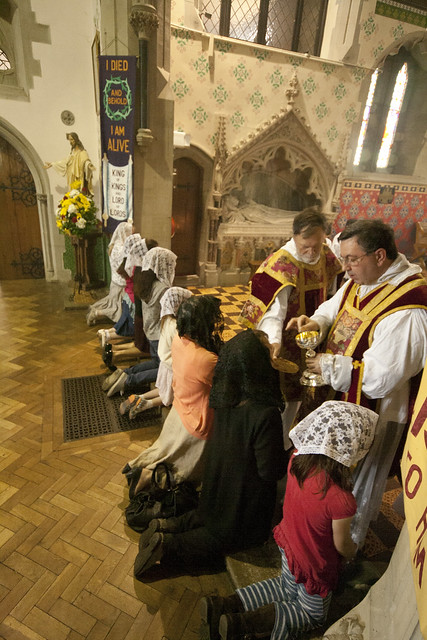
If you don't care about Christ, at least refrain from throwing the sinner into latrinam diaboli.

Sunday, February 09, 2014
Can the Church change marriage? 2: the 'Orthodox option'
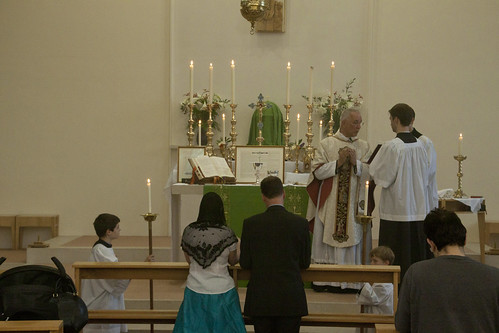
In my last post I made the point that being merciful to divorced Catholics seeking to remarry can be a failure to be merciful to those whose marriages or families would be destroyed, if the sanctity of marriage is yet further undermined. There is also the question, which I address here, of how exactly the Church's rules could be changed.
It has become common for liberals to appeal to the practice of the Orthodox churches as a precedent which could be followed by the Roman church in dealing with divorce. The Orthodox allow a second marriage, and sometimes a third, after divorce.
What is interesting is the way the Council of Trent defined the issue:
Can. vii. If any one shall say that the Church errs when she has taught, and now teaches, that according to the doctrine of the Gospels and of the Apostles the bond of Matrimony cannot be dissolved owing to the adultery of one of the partners, and that neither party, not even the innocent party who has not by committing adultery given any ground (for separation), is free to contract another marriage during the lifetime of the other partner, and that he who after putting away his adulterous wife marries another, commits adultery, or the wife who after putting away an adulterous husband marries another, let him be anathema.
This teaching, expressed as a formal anathema by a General Council, is infallible.
The argument is made - I am tentative because I'm not in a position to judge this on historical grounds - that this condemns the proposition:
P1: The Church is in error when she teaches that re-marriage after divorce is illicit.
and not the proposition
P2: Remarriage after divorce is licit.
in order to avoid condemning the Orthodox practice. This practice was in use among Greek subjects of Venice at that time of the Council of Trent, who were in communion with Rome. They could carry on saying that remarriage was possible (P2), as long as they didn't condemn the Roman view as wrong (P1).
As far as making possible the adoption of the Orthodox practice in the West goes, this is a pretty small mouse-hole to creep through. The first thing Catholic would-be reformers do when they propose a change is almost invariably to say that the Church has been in error to say that marriage is indissoluble. So they immediately incur Trent's anathema, and the argument ends there. It is terribly hard, in fact, to see how any articulation of the Orthodox view would escape the anathema, but the Orthodox do in fact affirm that marriage indissoluble, but somehow can 'die' as a result of sin.
I'm not going to try to explain what exactly this distinction means. It is open to Western theologians today simply to say that the Orthodox position is wrong, and that seems to be what Archbishop Muller was saying recently:
This practice cannot be reconciled with God’s will, as expressed unambiguously in Jesus’ sayings about the indissolubility of marriage. But it represents an ecumenical problem that is not to be underestimated.
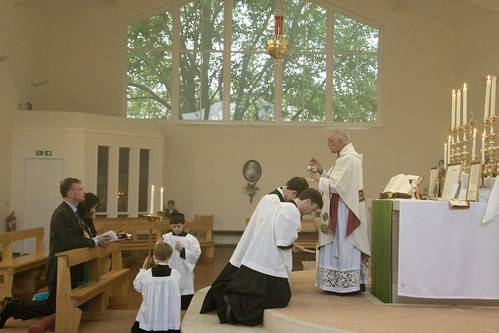
For the sake of argument, however, let us consider the possibility of the Roman church adopting the Orthodox practice. Would this solve the problem we currently have?
The difficulty here is that the Orthodox practice operates on different principles to the Western one. In the West we have procedures to determine nullity (to speak only of sacramental marriages): that the marriage never took place. If this is so, both parties are free to marry. It may, or may not, have been the result of one or both parties' sin, but in any case subsequent marriages are in no way impugned. There is no limit to how often this can happen. In societies with easy divorce and poor formation of Catholics, this practice can keep up with social conditions. More marriages are likely to be null.
For the Orthodox, there is no procedure of annulment. The first marriage is on the conscience of both parties. Remarriage is permitted as a dispensation, and the petitioner is given a penance. The subsequent marriage service is penitential in character. A third marriage might be allowed, but that is made even more low-key. Fourth marriages are forbidden - even when the spouses have died. The catch-phrase is that the Church "blesses the first marriage, performs the second, tolerates the third, and forbids the fourth."
No doubt cases which a Western tribunal would declare null will often be cases where among the Orthodox a bishop will allow a second marriage, and vice versa. It is actually not at all clear that the Orthodox practice is more lenient. It will in fact depend on what Orthodox bishop is being compared to what Western tribunal. There will certainly be cases in which a couple who could have got a decree of nullity in the West will not qualify for remarriage in the East.
What is clear is that one cannot make the Western practice more lax simply by adopting all or part of the Orthodox practice. The two systems work upon completely different principles, even if the results overlap. You couldn't keep the concept of nullity and add to it the idea that marriages can 'die' allowing a bishop to give you a dispensation to remarry along with a penance. That would create a Frankenstein theory of marriage with no support from the traditions either of East or West.
Another problem, for liberals, is this penitential business. Is this something which Western divorcees are really going to swallow? Such a thing seems, at least to me, quite inconceivable.
References to the Orthodox practice, in the debate about divorce and remarriage, are essentially a fraud. Liberals like the idea of remarriage without the first marriage being null, but they would never accept the corollaries which have maintained a practical respect of the sanctity of marriage in the East over the centuries.
It is, in fact, a familiar trick. Liberals see some aspect of practice of some former era, or some distant and unfamiliar rite, and seize on it as being attractive, but on closer examination they only find it attractive because they have ignored the context in which it actually makes sense.
Didn't people exchange the kiss of peace in the congregation once upon a time? Yes: but never between the sexes! Didn't people receive Communion in the hand in old times? Yes, but they never picked it up, and their hands had to be ritually washed afterwards, and sometimes before too. Didn't people stand for Communion in former ages? Yes - after kissing the priest's foot first, or something similar.
In fact, the idea that the Orthodox churches are some kind or paradise for liberals is so utterly absurd that the liberals using this argument should be ashamed. Since they think we have so much to learn from the Orthodox on the subject of marriage, let's hear what Metropolitan Hilarion (leader of the Russian Orthodox Church) has to say about Same Sex Marriage.
We have to state clearly that those countries that have recognized in law homosexual unions as one of the forms of marriage are taking a serious step towards the destruction of the very concept of marriage and the family. ...
The notion of parents, i.e. of the father and the mother, of what is male and what is female, is radically altered. The female mother is losing her time-honoured role as guardian of the domestic hearth, while the male father is losing his role as educator of his children in being socially responsible. The family in its Christian understanding is falling apart to be replaced by such impersonal terms as 'parent number one' and parent number two'.
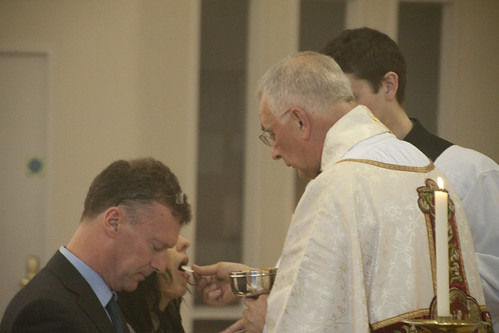
Saturday, February 08, 2014
Can the Church reform its marriage laws?

This weekend the untiring Mgr Basil Loftus (The Catholic Times, 9th Feb 2014) is making some perfectly innocuous remarks of Pope Francis in his address to the Roman Rota into a call for some kind of revolution. I don't think the judges of the Roman Rota will be too shocked to hear that justice has to be 'adapted to the needs of the concrete reality', and I certainly don't think the needs of the concrete reality are for annulments on dubious grounds. Pope John Paul II and Pope Benedict XVI made it abundantly clear, in fact, that the opposite is the case. The culture of easy divorce and poor marriage preparation is a concrete reality calling for great vigilance in protecting the sanctity of marriage, when the matter comes before Catholic Marriage Tribunals.
 |
| Watch out: Mercy at work. |
Joking aside, there is a problem here which often arises in ethics: the contrast between identifiable (potential) victims and non-identifiable ones. We can all think of people who would, personally, welcome a relaxation of the Church's laws. People who are divorced and remarried, who might like to be told that they can receive Communion. People who are divorced, who might like to be told they can marry again in church. These people suffer for the Church's discipline: there is no denying it. The people who would suffer from a relaxation are not so easy to identify. They are the spouses who would be abandoned, because not even a Catholic husband or wife any longer really regards marriage as inviolable. It is the children whose parents would separate, for the same reason. Lives shattered, children abandoned: we have seen these consequences with the Divorce Reform Act in the UK; do we really want to take the Church further down this road? The people who might be victims should the last vestiges of respect for marriage be loosened, because the last institution (beside the Mormons) on the planet which takes marriage seriously, has decided to throw in the towel, these victims of course will never write in to the papers on appear in a TV interview, because we don't know who they are going to be. Does this mean we can ignore them? Does that mean that protecting them doesn't count as a work of Mercy?
To sacrifice people we don't know, people we can't readily identify, for the sake of people we do know, people we've met and who have campaigns in the papers and get wheeled out to talk on the radio, without bothering even to consider how many there might be of each: this is not Mercy, it is self-indulgence. It is an indulgence of our sentimental feelings towards our chums, or to those who have made a favourable impression on us, which is merciless to those we don't know, people who are voiceless, not just, like the unborn, because they are too young, but because we won't know who they are going to be until it is too late. It is because they are unidentifiable, and therefore can't defend themselves as a group in advance, that they need our special protection.
But here is another question. What exactly do people like Basil Loftus want to see happen? What does he imagine can be changed, to make things 'easier', more 'Merciful'?
I am going to explore this in a couple of posts: first, the 'Orthodox option', and secondly, the 'relaxation of discipline' option.
Just for the record, Loftus once again displays his contempt for his superiors by attacking Archbishop Müller.
"The Mercy of the Lord is, then, my merit." Try telling that to Archbishop Müller. For him it does not seem to be true that because of God's Mercy, "where sin abounds, grace abounded all the more", certainly not within the confines of an invalid marriage... Is it not Müller who misses the mark?
This is the same Archbishop Müller whose appointment filled Loftus with such joy. Oh yes: back on the 8 July 2012, he gave his assessment of where the Archbishop's critics were going wrong. ‘Quite simply, he [Archbishop Müller] is profoundly scholarly and spiritual, and they [his critics] are not.’
This kind of misapprehension of a person's character might even be grounds for an annulment. But if Loftus can be wrong about this, what can we rely on?

Subscribe to:
Posts (Atom)